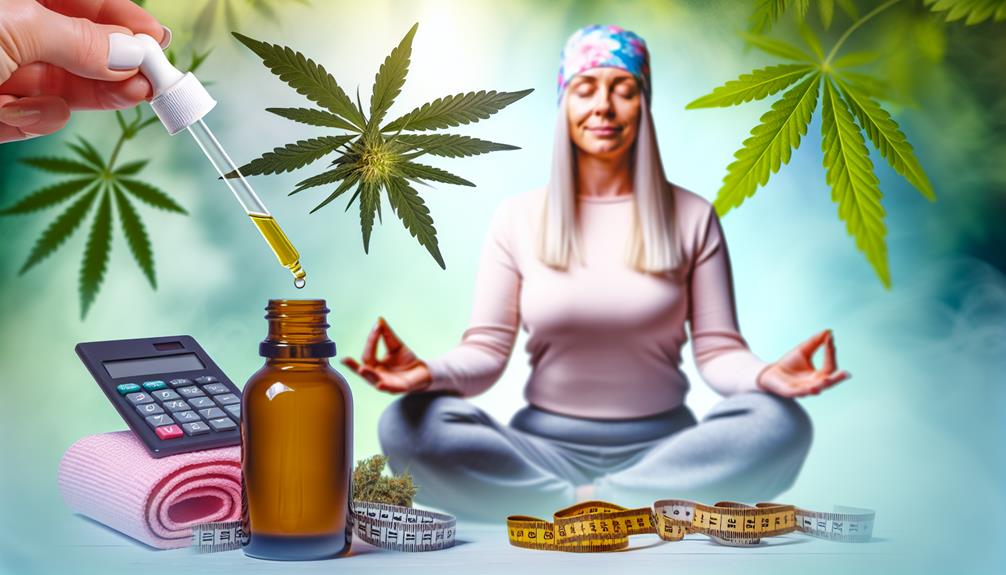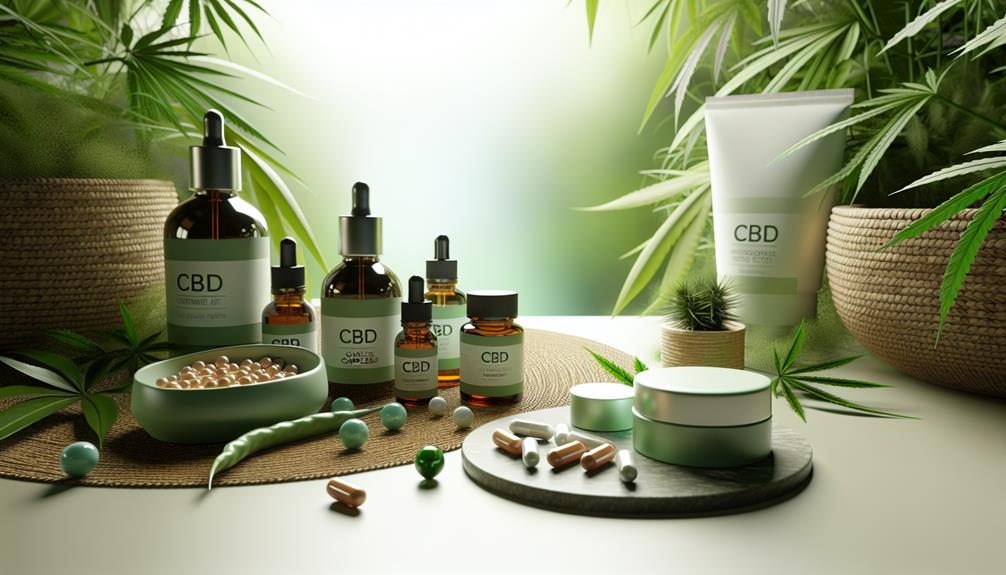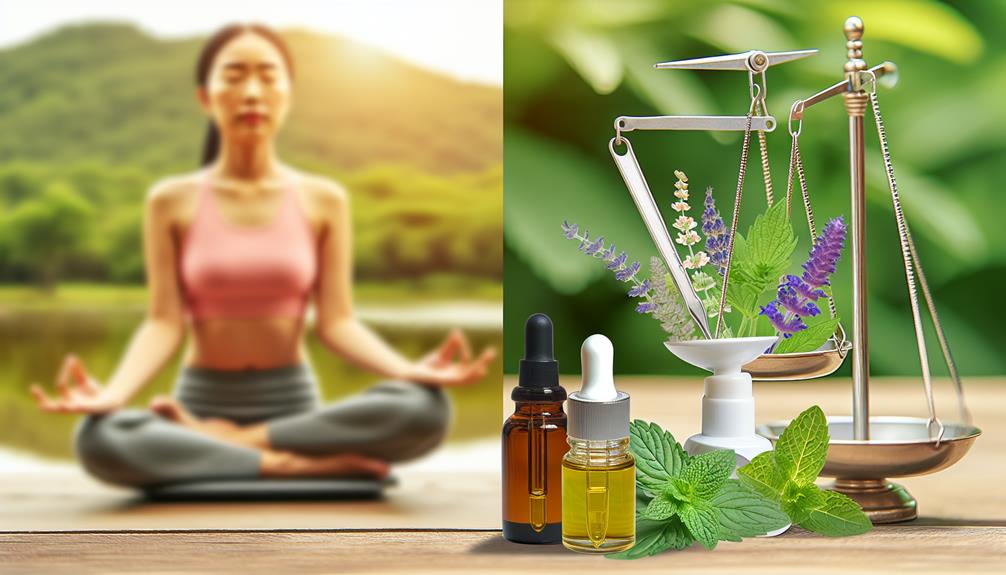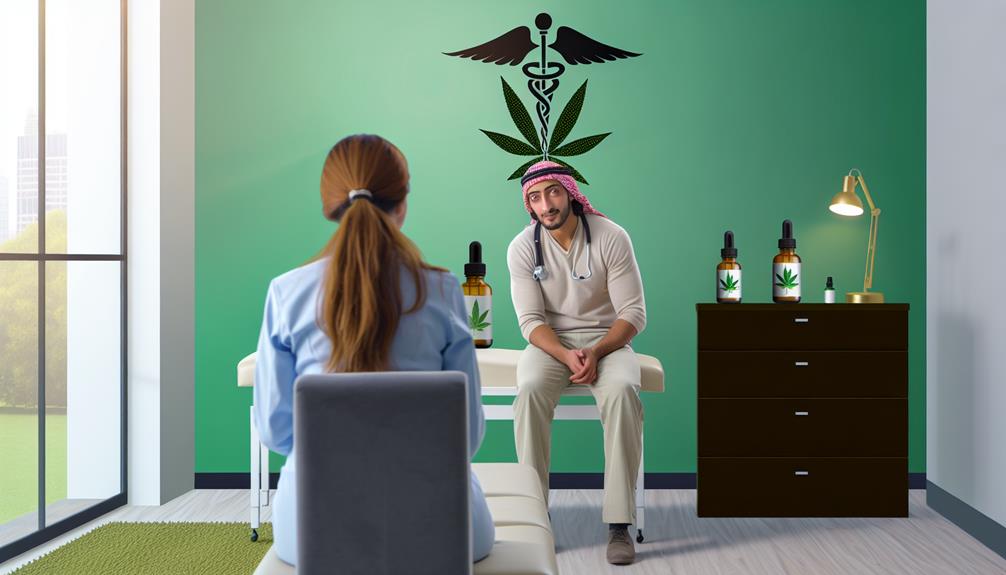As you stand at the threshold of the burgeoning world of CBD wellness, you're faced with the pivotal question: how much should you take? Navigating the waters of CBD dosage is not a one-size-fits-all journey; it's a personalized voyage that requires a keen understanding of your body's unique landscape. You've likely heard that starting low and going slow is the sage advice, but what does that mean in practical terms for you? The factors that dictate the ideal dosage—such as body weight, individual metabolism, and the specific wellness goals you aim to achieve—are as varied as they are vital. In your quest for balance and well-being, you'll need to consider not only the quantity but also the quality of the CBD you choose. As you adjust your sails to find that perfect dose, remember that patience is your ally, and precision, a guiding star. What other considerations might you need to weigh before charting your course through the complexities of CBD dosing?
Key Takeaways
- Body weight and metabolism play a significant role in determining the appropriate CBD dosage.
- The 'start low and go slow' approach is recommended to find the right CBD dosage.
- Consulting a doctor experienced in CBD use can provide personalized guidance for dosage.
- Consistency is important, as it may take time to observe the effects of CBD and adjust the dosage accordingly.
Understanding CBD Dosage
Grasping the nuances of CBD dosage is crucial, as it varies widely among individuals and hinges on factors like body weight, metabolism, and the specific wellness goals you're aiming to achieve. Finding the right CBD dosage is not a one-size-fits-all endeavor. You'll need to consider your own body weight, as it significantly impacts how much CBD you should take. Someone with a higher body weight may require more mg of CBD per dose to experience the desired effects compared to someone with a lower body weight.
Moreover, metabolism also plays a vital role in determining the proper CBD dosage. A faster metabolism may process CBD more quickly, potentially requiring a higher dosage or more frequent dosing to maintain the same level of wellness benefits. It's also essential to consider the potential side effects that can occur if the dosage is incorrect. While CBD is generally considered safe, some common side effects like dry mouth, drowsiness, or gastrointestinal discomfort may arise with improper dosing.
To ensure you're starting with an appropriate CBD dosage, the "start low and go slow" approach is often recommended. Begin with a minimal amount of CBD and monitor your body's response. Gradually increase the dosage until you find the level that meets your wellness goals without causing unwanted side effects.
Consulting a doctor, especially one experienced in CBD use, can provide personalized guidance, as limited FDA regulation on CBD makes self-dosing challenging. As you're calculating your dosage, especially with oils and tinctures, you'll need to account for the concentration per milliliter and determine the CBD content per drop to adjust your intake accurately. Remember to check for third-party testing and clear labeling to ensure the safety and quality of the CBD product you choose.
Factors Influencing Dosage
When determining the optimal CBD dosage for your wellness routine, you must consider several critical factors, including your age, gender, and the specific health condition you're addressing. Identifying the appropriate dosage is pivotal to ensure you're not taking too much or too little to see the desired effects.
One of the first factors to consider is your individual body chemistry. Everyone's metabolism and endocannabinoid system is unique, which means you may respond differently to CBD compared to someone else. This variability necessitates a personalized approach to dosage. It's often recommended to start low and go slow, meaning you should begin with a lower dosage of CBD and gradually increase it until you find the level that works for you.
Your body weight also plays a vital role in determining your CBD dosage. Generally, individuals with more body mass may require a higher dosage to achieve the same effects as those with less body mass. The nature and severity of the condition you're seeking to manage with CBD can further influence the dosage. Conditions with more pronounced symptoms may call for higher dosages, but this should always be approached with caution and ideally under the guidance of a healthcare professional.
As you embark on your CBD journey, keep in mind that consistency is key. It may take some time to observe the effects, as CBD builds up in your system. Monitoring your response to different dosages will help you refine the amount you take.
Calculating Your Ideal Dosage

To pinpoint your ideal CBD dosage, you'll need to consider starting dose guidelines that factor in your body weight and the severity of your condition. Once you've established a baseline, you can adjust the amount gradually, keeping a close eye on your body's reactions to find the perfect balance. Remember, it's essential to consult with a healthcare professional to tailor the dosage to your specific health goals and to ensure safety.
Starting Dose Guidelines
Embarking on your wellness journey with CBD starts with understanding how to calculate your ideal starting dose, which is best determined in consultation with a healthcare professional experienced in CBD use. The "low and go slow" approach is key to dosing CBD responsibly, allowing you to monitor the effects of CBD on your body and adjust accordingly.
Here are starting dose guidelines to consider:
- Determine milligrams per mL: Know the CBD concentration in your product.
- Start small: Begin with a low dose to assess your body's response.
- Gradually increase: If well-tolerated, slightly raise the dosage.
- Observe effects: Pay close attention to your body's reactions.
- Adjust as needed: Tailor the right dosage based on your individual experience and health goals.
Dosage Adjustment Strategy
Navigating your ideal CBD dosage requires considering personal factors such as body weight, metabolism, and the specific health outcomes you aim to achieve. Initially, begin with a lower dose and attentively monitor your body's response. Gradually increasing the dosage allows you to calibrate the amount you consume to the desired effect. Utilize digital tools like mydosage.com to guide your CBD dosing decisions, incorporating expert advice and symptom tracking into the calculation.
Consulting a healthcare professional with expertise in CBD can provide personalized insights to fine-tune your regimen. As you adjust your CBD dosage over time, maintain a detailed journal. This empowers you to recognize patterns and determine the most effective CBD dosage for your wellness journey, ensuring high doses are approached cautiously and adjust accordingly.
CBD Dosage by Ailment
When considering CBD dosage for specific ailments, it's essential to recognize that individual conditions necessitate tailored dosing strategies, with research suggesting varying amounts for different health issues. You'll want to approach using CBD with a detail-oriented mindset, focusing on the potential benefits of CBD for your particular condition while being aware of the therapeutic effects you're aiming to achieve.
Determining how much CBD to take can be complex, especially since the FDA has not approved specific doses of CBD for any health conditions. This underscores the importance of consulting with a healthcare professional who is experienced in CBD administration. They can guide you on appropriate CBD dosages and monitor potential interactions with other medications.
Here are some key points to consider when using CBD for different ailments:
- Anxiety Disorders: Studies imply that lower doses of CBD may be effective for anxiety relief.
- Chronic Pain: Higher doses are often recommended for more severe pain management.
- Sleep Disorders: CBD oil dosage should be carefully adjusted, as too much may lead to drowsiness.
- Inflammatory Conditions: Dosage may vary depending on the severity and type of inflammation.
- Neurological Disorders: Precise dosing is critical due to the sensitivity of neurological responses to cannabinoids.
It's crucial to understand that incorrect CBD dosage may lead to unwanted side effects, such as dry mouth or diarrhea. The ongoing nature of CBD research means that recommendations may evolve over time, so staying informed and working closely with your healthcare professional is key to safely and effectively incorporating CBD into your wellness routine.
Methods of CBD Consumption

Understanding the various methods of CBD consumption is crucial, as each offers different rates of absorption and onset times that can significantly influence your wellness experience. When considering CBD dosage based on the type of CBD, it's essential to recognize how the forms of CBD affect bioavailability and efficacy.
Inhalation through smoking or vaping allows CBD to be absorbed rapidly into your bloodstream via the lungs. This method provides a quick onset of effects, making it a suitable option if you're seeking immediate relief. However, the exact CBD content can be challenging to measure with this product type.
Sublingual administration involves placing CBD oil or tinctures under your tongue for direct absorption. This route bypasses the digestive system, leading to fast-acting results without waiting for digestion.
Alternatively, consume CBD edibles like Full Spectrum CBD Gummies or CBD Isolate capsules. These products contain a precise amount of CBD, allowing you to monitor your dosage easily. However, because they pass through the digestive system, the onset of effects is slower, and the overall bioavailability may be reduced compared to inhaled or sublingual CBD.
Topicals, such as creams and lotions, are applied directly to the skin. They target localized areas for relief and generally do not enter the bloodstream. The CBD content in these products varies, so it's vital to pay attention to the product label for proper dosing.
Lastly, suppositories offer an alternative consumption method, particularly beneficial for those who cannot ingest CBD orally. They provide efficient uptake by bypassing the digestive system, allowing for consistent dosing.
Recognizing Overconsumption Symptoms
While experimenting with different methods and dosages of CBD to find what works best for your wellness needs, it's also vital to be aware of the symptoms that might indicate you've consumed too much. On your CBD journey, recognizing overconsumption symptoms is key to maintaining Health and ensuring you experience the potential benefits without the unwanted side effects.
When taking CBD, it's important to start with a low dose and gradually increase it. This helps you feel the effects without going overboard. However, if you notice any of the following symptoms, it may be a sign that your CBD dosage needs adjustment:
- Drowsiness: Feeling unusually sleepy or lethargic after taking CBD could suggest you've exceeded your optimal dosage.
- Dry Mouth: A common side effect of overconsumption is reduced saliva production, leading to discomfort.
- Light-headedness: If you feel dizzy or light-headed, your dosage might be too high.
- Diarrhea: High doses of CBD can disrupt your digestive system, resulting in diarrhea.
- Diminished Benefits: Instead of feeling better, you might find that too much CBD lessens the therapeutic effects you seek.
Safety and side effects are closely linked when it comes to CBD. To avoid any health risks associated with overconsumption, pay close attention to your body's responses. If you encounter any of the above symptoms, consider reducing your dosage. For personalized guidance, consult with a healthcare professional who can help you navigate the potential side effects and find the right balance for your needs. Remember, everyone's body reacts differently, and what works for one person may not work for another.
Adjusting Dosage Over Time

Finding your optimal CBD dose requires attentive adjustment over time, factoring in your body's unique response to the compound. As CBD becomes increasingly popular for its wellness benefits, it's crucial to understand that the best CBD dosage is not a one-size-fits-all scenario. You may start with a low dose, but as you pay close attention to the effects on your body, you might discover that you need to adjust the amount you take.
When adjusting your dosage, it's key to do so gradually. This careful approach allows you to monitor the effects and determine the minimum effective dosage that your body needs. Keep in mind that higher doses may take longer to show their full effect, and jumping too quickly to a larger amount can lead to overlooking your ideal dosage or experiencing unwanted side effects.
Maintaining a detailed journal can be an invaluable tool in this process. Record your dosages and any changes in how you feel, both positive and negative. This record-keeping will provide you with a clear picture of how your body responds to adjustments in CBD dosage over time.
Consulting with a healthcare professional is always recommended, especially when you're considering increasing your dosage. They can provide personalized guidance based on factors such as your body weight, metabolism, and any potential interactions with other medications.
Importance of CBD Quality
To ensure you're getting the most out of your CBD regimen, it's critical to prioritize the quality of the products you select. The CBD Dosage: How Much you consume is integral to your wellness journey, but equally important is the purity and safety of the CBD Extract in your chosen products. Scientifically speaking, a high-quality CBD product not only guarantees the desired effects but also maintains compliance with federal regulations.
When discussing CBD Products, whether they're CBD Gummies, oils, or topicals, the presence of third-party testing is a hallmark of quality. This external verification ensures that the CBD is THC free, adheres to the 'federally legal' status, and contains pure CBD without harmful contaminants. Here's what you should look for to understand the quality of your CBD:
- Third-party lab results: Certifies the potency and purity of the CBD.
- Extraction method: CO2 extraction is known for producing high-quality CBD.
- Source of hemp: Organically grown hemp is less likely to contain pesticides.
- Clear labeling: Accurate information on CBD content and dosage instructions.
- Brand reputation: Choose brands with positive reviews and industry credibility.
The Food and Drug Administration (FDA) does not regulate the variety of CBD products in the market as it does pharmaceuticals, so it's up to you to ensure you're using a quality product. Be aware of the extraction processes and sourcing practices of the CBD you consume. By doing so, you can more accurately determine the CBD Dosage: How Much you need to achieve your wellness goals, while also ensuring the product is safe and effective.
Consulting Healthcare Professionals

Why should you consider a consultation with a healthcare professional experienced in CBD when seeking personalized dosage guidance? Consulting healthcare professionals is pivotal because they can provide you with safe and effective CBD dosage recommendations tailored to your unique needs. Factors such as your individual health condition, weight, and the endocannabinoid system's role in determining the right dosage are best assessed by a medical expert. They can also navigate potential interactions with prescription drugs, ensuring your wellness journey is as safe as it is beneficial.
Please consult with a health care provider who understands Medical Cannabis and the Drug Administration (FDA) stance on CBD products. A healthcare professional's guidance is crucial, as the FDA has not yet established general guidelines for CBD dosages, making personal medical advice even more significant.
The table below illustrates steps to take when consulting a healthcare professional:
| Step | Action |
|---|---|
| 1 | Discuss your wellness goals and medical history. |
| 2 | Review any current medications for potential interactions. |
| 3 | Determine a starting dosage and titration plan. |
Starting with a small dose and gradually increasing while monitoring effects is a common practice endorsed by health care professionals. This approach allows you to gauge your body's reaction to CBD and adjust accordingly. Remember, the goal is to find a balance that supports your wellbeing without causing undesirable side effects.
Frequently Asked Questions
Can CBD Interact With Other Medications or Supplements I Am Currently Taking?
Yes, CBD can interact with medications or supplements you're taking. It may cause drug interactions, including enzyme inhibition, which can affect metabolic considerations. Be cautious with blood thinners, as CBD can alter their effectiveness. Prescription conflicts aren't uncommon, and over-the-counter risks exist. It can influence hormonal modulation and warrants caution with antidepressants. Supplement synergy varies, and alcohol effects may be intensified. Always consult a healthcare provider before mixing CBD with other substances.
How Does the Time of Day I Take CBD Affect Its Efficacy for Wellness Purposes?
You're juggling time like a circus act, so when you swallow that CBD, timing's key. Slip it into your morning routine for an energy boost and sharper cognitive function. Taking it before bed can improve sleep quality. Its efficacy hinges on your body's absorption rate and could influence stress relief, mood regulation, and hormonal balance. Post-exercise, it might aid recovery. Remember, time your doses for anxiety reduction and to keep your wellness on track.
Are There Any Differences in CBD Dosage Recommendations for Acute Versus Chronic Conditions?
Yes, CBD dosage recommendations differ for acute and chronic conditions. Acute relief may require higher, immediate doses due to symptom severity, whereas chronic management often involves lower, consistent dosages to prevent tolerance development. Dosage variability, administration methods, and bioavailability factors all play roles. Condition specificity is crucial, as is finding therapeutic thresholds within personalized protocols. Always consider these variations when establishing your regimen to optimize efficacy.
In What Ways Can My Diet or Lifestyle Influence the Effectiveness of My CBD Dosage?
Your metabolic rate, nutrient interaction, and absorption factors affect how your body processes CBD. Staying hydrated, moderating alcohol consumption, and maintaining good digestive health enhance its efficacy. Exercise can influence CBD's impact, while your stress levels and sleep quality might alter its effectiveness. Be mindful of potential allergic reactions, and adjust your lifestyle choices to support the optimal use of CBD for your health goals.
Is There Any Research on the Effects of Long-Term CBD Use at Various Dosages on Overall Health and Wellness?
You're wondering if research exists on long-term CBD impacts at varying doses, right? Well, studies do focus on CBD longevity, examining how consistent dosages affect health markers like immune response and hormonal balance. They delve into mood regulation, sleep patterns, cognitive function, and metabolic effects. Plus, the potential antioxidant impact of CBD over time is a hot topic. It's crucial to seek evidence-based information to understand these long-term effects fully.
